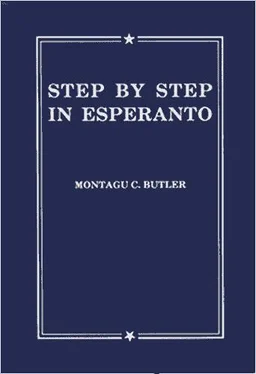It is not obligatory to use geif the context makes it clear that both sexes are intended, or if it is unnecessary to emphasize this (see [12], [24]). Cp. (ge)edziĝo, marriage (619).
It is permitted to the feline race
To contemplate at ease a royal face.
Miscalculations multitudinous
Co-operate with utter malice
Twixt labial orifice and chalice
To shatter all the hopes imbued in us.
In the case of devas,early writers ignore this distinction. But it is logical, and increasingly recognized.
Cp. [53].
Alternatives: Li ne povas eviti iri, Li ne povas resti for.
When the “Tube” underground railway was opened in London, Esperantists asked themselves: “Ĉu tubiaŭ ne tubi?”
Observe yon plumed biped fine!
To effect his captivation
Deposit particles saline
Upon his termination.
Do not mispronounce this word.
But not every English word ending with ‑ly is an adverb. E.g., lovely bela; holy sankta;( holily , sankte).
Where fluvial aggregations lie
Uncorrugated to the eye,
Their currents, one infers, may be
Impressive in profundity.
Despise not wealth, nor heap on it abuse,
For cash and filthy lucre have their use.
Pecuniary agencies have force
To stimulate to speed the female horse.
In verse the ending -omay be replaced by an apostrophe, thus: kat’, katin’, mont’(= kato, katino, monto). Por hom’ inteligenta, ĝi estas evidenta.The accented syllable remains the same.
In these comparisons of degree some would say: tiom alta, kiom vi. This is not advisable.
Domaĝi= to wish to keep intact (unspoiled, whole), fear to damage (lose, spend). Domaĝi( begrudge ) la monon (tempon). Li restis hejme en pluva vetero ĉar li domaĝis( did not wish to spoil ) la ĉapelon. Dio domaĝis( spared ) Nineven(Jona 4:10). Cp. difekti, to damage.
Kccorresponds to English cc, ct; ksand kzto x .
Who sums the yet unfractured shells of bipeds gallinaceous
Is apt to find his calculations woefully fallacious.
Thinking thine equine friend in noontide heat
Draughts from the cool and rippling rill desires,
Stand not amazed, if the ungrateful beast
Merely to see his mirrored face aspires.
Observe yon ovine innocent
When stripped of his integument!
For him kind Providence ne’er fails
To moderate hiemal gales.
Dethus means of (45), from (122), or (after -ita) by. These are all variants of one idea: that of origin.
When the root names the action , the tool is formed from it by -ilo.Some roots name the tool itself. E.g., broso, brush; pioĉo, pick-axe. N.B. Broso kaj kombilo.
If the term with ‑ilois too wide in meaning, the technician may need a more precise root. E.g., ŝpato( spade ) is more definite than fosilo( digging instrument ). Nevertheless fosilois more used in ordinary life.
Other English words meaning -aro(“nouns of multitude”) are listed in Nuttall’s Dictionary, 1929 edition, page 92 of Appendix (followed, incidentally, by the Esperanto grammar).
Except nulo, miliono,which are nouns.
A futile superfluity of culinary aid
Will mar the gastronomic juice of osseous tissues made.
The preposition after these words is usually da;but not necessarily. Kiom el vi povas legi? Kiom de tiu pano? (694).
The following may help the memory: “ Ju( you ) first, des( that’s ) right.”
«Sumo da mono» estas mono . Ĉi tie necesas diri nombron , do la « sumon demono». — Ed.
Some say that ajnshould not be used in a question. [ Publisher’s Note: Use doinstead: “Kial do li tiel parolis?”]
Inhabitants of domiciles of vitreous formation
With lapidary projectiles should make no rash jactation.
Flegi, nurse, tend (as a hospital nurse). Varti, nurse, look after (as a nursemaid).
Occasionally met: ĉi-(short for ĉi-tiu‑): ĉi-matene (=hodiaŭ matene), ĉi-vespere, ĉi-nokte.
Cp. ĝusta (201), correct, right, just so; justa (591), just, fair; and tuj (783). Ĝuste kiam,or Tuj kiam(NOT ĵus kiam), at the precise moment when, just when, directly …
Mnemonic: Jam is changed fruit!
Do not confuse jam, already , with tute preta, all ready ( quite ready ).
The forms ne jam (= ankoraŭ ne)and ne ankoraŭ (=jam ne),though logically possible, are confusing, and better avoided.
Esceptedoes not translate the preposition except. It is an adverb, meaning exceptionally, as an exception, etc. Kutime mi venas je 3.0; sed hodiaŭ, escepte, mi venos je 2.0.
In such phrases one meets sometimes the nominative ( paŝo post paŝo), sometimes the accusative ( paŝon post paŝo). Z. used both forms, though more often the nominative. The accusative is now more usual. Often either form is defensible. E.g., la pluvo falis; guto(falis) post guto,or guton(= po guto) post guto.
Читать дальше












